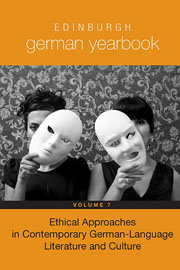 Edinburgh German Yearbook 7
Edinburgh German Yearbook 7 Published online by Cambridge University Press: 05 December 2013
“How is it possible for one to no longer be the subject of a truth?” asks Alain Badiou, one of the most significant and original French philosophers of the generation succeeding Foucault, Derrida, and Lyotard. The protagonist of Uwe Timm's novel Rot (2001), Thomas Linde, a former activist in the student movement, had tried to shut out such unsettling questions as much as possible. Twelve days before the story begins, though, he learns that a former comrade, of whom he had lost track for more than twenty years, has died. The news functions as a catalyst for a process in which the protagonist is again gripped by the “Rigorismus seiner Jugend.” Linde is killed in a car accident, and the novel leaves it open whether he would have been able to become “the subject of a truth” and to commit himself to the “Unbedingtheit des einmal Erkannten” (R 379). However, much of the richness and complexity of this novel originates from the clash between what one might call his revived 1968 ethics and what Alain Badiou would term the “consensual ‘ethics’” of this protagonist's social environment (E 32).
To save this book to your Kindle, first ensure [email protected] is added to your Approved Personal Document E-mail List under your Personal Document Settings on the Manage Your Content and Devices page of your Amazon account. Then enter the ‘name’ part of your Kindle email address below. Find out more about saving to your Kindle.
Note you can select to save to either the @free.kindle.com or @kindle.com variations. ‘@free.kindle.com’ emails are free but can only be saved to your device when it is connected to wi-fi. ‘@kindle.com’ emails can be delivered even when you are not connected to wi-fi, but note that service fees apply.
Find out more about the Kindle Personal Document Service.
To save content items to your account, please confirm that you agree to abide by our usage policies. If this is the first time you use this feature, you will be asked to authorise Cambridge Core to connect with your account. Find out more about saving content to Dropbox.
To save content items to your account, please confirm that you agree to abide by our usage policies. If this is the first time you use this feature, you will be asked to authorise Cambridge Core to connect with your account. Find out more about saving content to Google Drive.